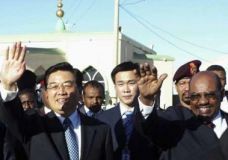China on diplomatic highwire over Darfur
April 24, 2007 (BEIJING) — Buffeted by an international outcry over turmoil in Darfur, China has wavered between offering to work closer with the West and guarding ties with Sudan, highlighting how nervously Beijing handles its rising prominence.
 China buys much of Sudan’s oil and as a permanent member of the U.N. Security Council can stymie proposals to send U.N. peacekeepers to Darfur, the ethnically mixed region of west Sudan where government-linked militia have been fighting rebels, leaving settlements wasted and some 2.5 million refugees.
China buys much of Sudan’s oil and as a permanent member of the U.N. Security Council can stymie proposals to send U.N. peacekeepers to Darfur, the ethnically mixed region of west Sudan where government-linked militia have been fighting rebels, leaving settlements wasted and some 2.5 million refugees.
Western rights campaigners have accused Beijing of not pressing Sudan enough to end the violence that has killed about 200,000 according to the U.N. China’s recent burst of high-profile diplomacy suggests it wants to fight such claims.
“There’s clearly been a shift since last year in how China deals with Darfur and how Washington deals with China on the issue,” said Andrew Small, a researcher with the German Marshall Fund in Brussels who follows Chinese foreign policy.
That fresh urgency, however, has been offset by worries about Western motives and a desire to protect China’s big stake in Sudan, leaving Beijing straddling a diplomatic highwire between Western pressure and Sudanese resistance.
“They’re trying to hold off even stronger action from Washington and Brussels. It’s also a holding operation,” Small said of China’s moves.
NEW CANDOUR
China’s steps over Darfur leaves little doubt that Beijing is worried that further strife there could stain its image, endanger investments and strain ties with Washington.
“The Chinese are getting concerned about the scrutiny they’re under,” said Larry Rossin, a former U.S. and U.N. diplomat who now represents the Save Darfur Coalition, an umbrella group.
China’s special envoy to Sudan, Assistant Foreign Minister Zhai Jun, discussed the crisis with U.S. officials in March and a month later visited refugees in Darfur.
When Sudan’s Joint Chief of Staff visited Beijing this month, China pointedly announced that People’s Liberation Army commanders discussed Darfur.
China has publicly urged Khartoum to allow implementation of the “Annan” plan that Beijing helped broker last November. The plan entails a hybrid peacekeeping force combining U.N. troops with African Union forces already in Darfur. Overstretched AU troops have failed to stop much bloodshed.
China’s calls appeared to “play some role” in Sudan’s announcement last week that it would accept the first stages of the hybrid U.N.-AU force plan, said Rossin.
China’s movement on Darfur came after calls from activists to shame Beijing into cutting support for Sudan’s President Omar Hassan al-Bashir by boycotting the 2008 Olympics.
Such calls have stung, said Xu Weizhong, an expert on Africa at the China Institutes of Contemporary International Relations, a government thinktank.
But Beijing’s increased activism predated the boycott calls, and has also been driven by closer dialogue with Washington, said Stephen Morrison, an expert on Africa at the Centre for Strategic and International Studies in Washington.
Talk between Washington and Beijing has included a possible Chinese contribution to the U.N. force, he said. Such a presence may allay some of Sudan’s suspicions about its role.
“China now has the sense that Washington is at least listening to its concerns about the effects of international pressure on Sudan,” said Xu. “I think China has also become more relaxed about the United States’ thinking.”
DIPLOMATIC HIGHWIRE
But Beijing has also stressed that it does not want to alienate Bashir and has balanced gentle pressure over Darfur with reassuring gestures to Sudan.
When Zhai visited the refugee camp, Chinese press reports lauded conditions there.
“The words that Zhai Jun said when he was in Darfur were the very same words that I heard when I was in the governor’s office in southern Darfur. He was mouthing Sudan’s line,” said Rossin.
For China, the stakes are economic as well as diplomatic.
So far this year, Sudan has been China’s sixth-biggest foreign oil supplier and it has been the biggest target for Chinese investment in Africa.
In the first three months of this year, China shipped 2.6 million tons of crude from Sudan, up 396 percent on the same period last year, when shipments were unusually low.
But China’s diplomatic highwire act may become tenuous if Bashir continues fending off the Annan peace plan.
U.S. President George Bush warned Bashir last week that he had one last chance to avoid sanctions by allowing a full joint U.N.-AU peacekeeping force. Beijing has repeatedly said it opposes sanctions.
Ultimately, though, China may abstain from but not back a Security Council vote imposing some sanctions if Bashir continues to hold off implementing the peace plan, Morrison said.
“Now the Chinese are in a bind,” Rossin said. “I think it’s going to be more difficult for them to veto, but they’ll try to water down any resolution anyway.”
(Reuters)
